The local hackerspace in Tirana, Albania might be small, but they make up for size in spirit. During the weekend of March 18-19, 2017, the Open Labs Hackerspace organized the first-ever, 48-hour "open source" hackathon focused on the United Nations Sustainable Development Goals.
The UN Sustainable Development Goals are 17 objectives identified by the United Nations Development Programme (UNDP) to build a better world, starting in our own communities.
Some of the goals include quality education, gender equality, decent work and economic growth, clean energy, and more. During the course of the hackathon, participants selected a goal, broke into teams, and worked on projects to make real change in their own neighborhoods. In the spirit of open source, all projects are made available under free and open licenses.
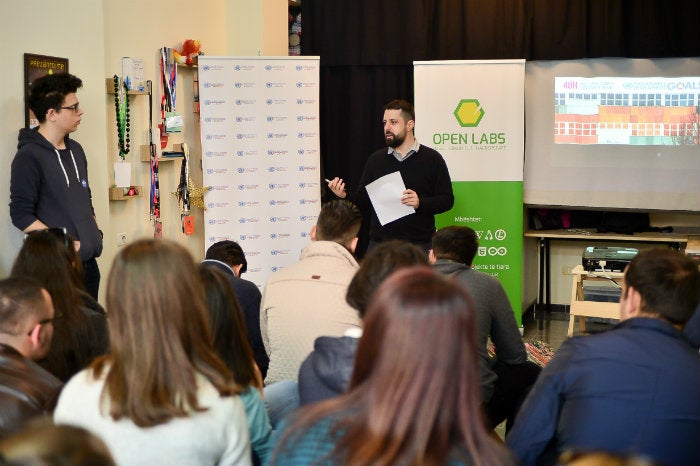
Redon Skikuli addresses all attendees in Open Labs to kick off the hackathon.
Organizing the hackathon in Albania
The board members of Open Labs oversee most of its operations and help guide members in hosting events and keeping the hackerspace busy. The current board members are Redon Skikuli, Jona Azizaj, Elio Qoshi, Kristi Progri, and Anisa Kuci. However, they emphasize that it's strongly a community-based organization.
Board members invite others to take part in the organization's governance. When the opportunity came to take part in this event, the board members felt it was a great opportunity to try something new. While hackathon events are popular and well-known in the United States and elsewhere, this was foreign territory for the community.
"At first, we were nervous because this type of 48-hour event was new for Open Labs but also for Albania. But we wanted to use this as a chance to introduce the open source philosophy to new people and to show what we do and why," said Azizaj. The organizers hoped to appeal to a wider audience than only active community members too.
Organizing the hackathon was a challenge since many of the core team members were traveling the week before the event. However, community members and UN representatives were more than willing to help with organizing the hackathon. This event also required a level of coordination that was uncommon for the normal type of event organized in Open Labs. "When planning, we were hoping to reach out to non-members of Open Labs too. This way, more people are exposed to open source and its culture. This lets people who want to make a change but don't know how to understand what is available to help them," said Skikuli.
When the Friday before the event arrived, the team was ready for a weekend of open source, civic hacking. On Saturday morning, approximately 30 people were present for the event kick-off. Open Labs members and United Nations representatives introduced the hackathon and the themes for attendees to focus on during the weekend. Attendees were a diverse group of people as well: there was a balance between technical and non-technical people, and the gender ratio was almost evenly split between males and females.
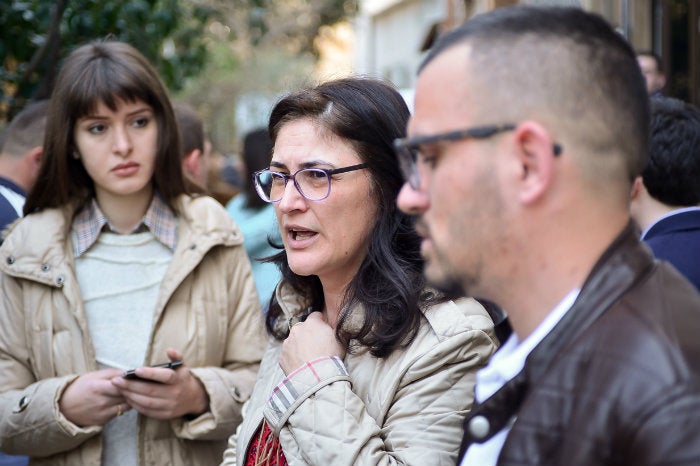
The visiting representative from the United Nations meets participants and helps work with them on brainstorming ideas.
The projects
The Open Labs organizers placed emphasis on networking between participants at the beginning. The event started with introductions and each participant made a note of whether they were a technical or non-technical contributor. After this, they wrote their names on sticky notes along with their preferred goals to stick on the wall.
Participants were paired up with someone with a different background but with a mutual interest in a specific goal. "We separated participants into two groups: technical and non-technical. Our idea was the two sides would complement each other to share experiences to build a strong team," said Azizaj. After the teams were formed, they began brainstorming and working on their projects. Mentors were available to offer support to participants and to introduce them to open source tools to help them prototype their projects.
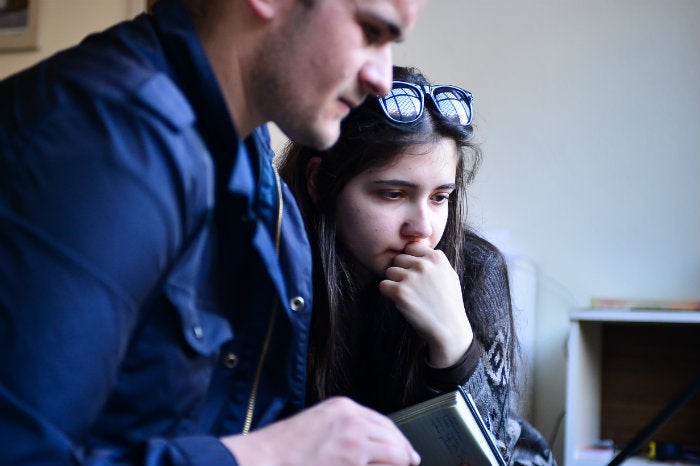
Two attendees work together on their project idea.
World of Sounds
One participant, Silva Arapi, worked with teammates Dritan Sakuta, Hulemita Leka, Kristi Leka, and Klajdi Qehaja to address reduced inequalities on a project called "World of Sounds."
The application is a resource for parents of children with hearing or speaking disabilities. "World of Sounds is a platform to understand early on to improve education of parents and accessibility for children. This is very helpful for rural parts [of Albania]," Arapi explained.
She has been involved with the Open Labs community for almost a year and a half. It was her first hackathon but she also hadn't seen an event like this in Albania before. "It was a new experience and something different. We get something done in 48 hours to have a social impact—why not participate?" Arapi balances her time leading the NextCloud efforts in Tirana while working towards her master's degree in Information Security. She hopes to take part in another event at Open Labs like this again in the future.
Tackling gender equality in Albania
Another Open Labs community member came with an idea with a friend to try thinking through a specific issue she has seen in her community. Nafie Shehu is an Information Communication Technology student and has been involved with Open Labs for the past seven months. With her, she brought her friend Afrim Kamberi to help, for his first visit to Open Labs and an open source event in Tirana.
Shehu's selected goal was gender equality combined with an experience of one of her friends. In some rural areas and villages in Albania, women have a more difficult time maintaining their rights. They rarely have financial independence, and as a result, this sometimes leads them to live a life they might not want. Sometimes, women are obligated into a non-consensual marriage and aren't in a place to defend what they want for themselves. Her friend was in this situation and divorced later, but she didn't know where to go after and had little resources of her own.
Nafie heard about this story and it deeply affected her. She hoped to brainstorm ideas on how to improve this problem. After research and looking at other solutions, she discovered similar attempts had been started to solve this problem. However, for various reasons, they were ineffective and weren't thorough solutions to the problems. While this changed her own project development, she finished the hackathon determined to find ways to improve on what was already there and continue this even after the weekend ended.
Closing the hackathon
Towards the end of Sunday, participants put the last touches onto their projects. The deliverable product was prepared and all participants organized a short presentation to demo their project. "In the end, you get a real product, not just talking. It's a real product that has an impact," Progri explained. All of the various teams pitched their projects to the Open Labs community and to representatives from the United Nations.
In the project presentations, teams were given specific criteria to present in the project.
- Summary or main idea of the project
- Sustainability of the project for implementation beyond the weekend
- Recommendations for funding the project / creating a budget to carry it out
- Reasons why they would support this if it wasn't their own project
After the presentations, teams were given the option to send their information and projects to the UNDP via Open Labs. The UNDP will select one project and team to bring to the United Nations office in New York City to propose their project and seek support to develop it further.
That's a wrap!
After closing ceremonies and words of encouragement from Skikuli, the hackathon came to an end.
Both participants and organizers felt it ended on a high note. "I love coming to these events to learn new things, meet new people, and they're cool!" Arapi said. Additionally, the organizers hoped that participants left with valuable knowledge and resources that would go beyond this weekend. "We hope people understand the role open source had in this event and understand why the philosophy is so important," Qoshi explained. "Some people might think the projects are the main part, but networking with people from different backgrounds goes beyond the event. These connections support sustainability for people working together. We hope these projects continue beyond this event."
The presence of open source software and its philosophy was present throughout the event. Stickers and swag from various open source projects were available for participants to take. This included stickers from Mozilla, Fedora, LibreOffice, NextCloud, and more. "We hope attendees enjoyed the experience and had fun meeting new people. Later on, when they leave Open Labs and work on their own projects, we hope they will remember open source tools to build their work and create FOSS solutions," said Azizaj.
What's next for Open Labs?
This was a milestone event for the Open Labs community, but they have more on the horizon after the weekend of this event. Organizers, volunteers, and members are putting together the first Linux Weekend in Tirana, March 25 - 26. This is a traditional barcamp-like model with talks and workshops by several local and international speakers. However, there are a couple of goals ahead that the team hopes to begin working at.
One of them is a book in time for the hackerspace's fifth anniversary. The book would be an "open source handbook" in the Albanian language. Not only would it have the history of Open Labs, but it would introduce various open source projects and connect readers to resources so they could have an impact on a project. Additionally, the team is looking at policy in their government as a next step.
Qoshi had a great deal to say on this: "It feels like we're reaching critical mass and gaining momentum to influence local policy in Albania. We want to push for open policies and government, especially with the coming elections in June. This is a great opportunity to let people know our stances on policies. Pushing FOSS only in our space can't be an insider secret—we need conversations with people coming from different views if we want change."
You can learn more about the hackerspace online at their website.

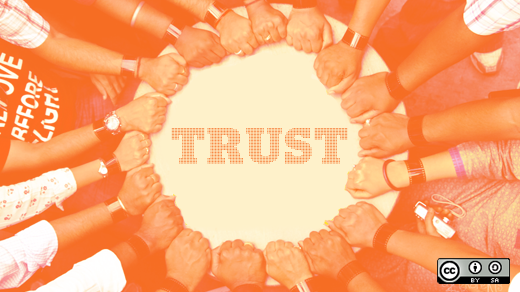
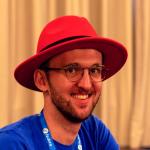




Comments are closed.